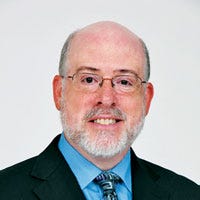It’s 2014—where is our medical tricorder? The ubiquitous Star Trek implement was the go-to device aboard the Enterprise for diagnosis and patient monitoring.
July 10, 2014
|
Bresler |
We haven’t quite perfected the tricorder, but the medical devices of the near future are starting to look more and more like yesterday’s science fiction. Rapid advances in hardware, software, and medical knowledge are fueling a healthcare revolution driven in part by innovative devices that improve the speed and accuracy of diagnosis, facilitate communication between doctors and patients, and automate the delivery of care.
Here’s what the next five years may look like for patients and healthcare professionals.
More Mobile
Mobile health, or mHealth, is one of the hottest trends on the market today. Done right, mobile healthcare apps put medical care right in the hands of patients, wherever they happen to be. Right now, many of the health-related apps in the mobile marketplace are consumer-focused apps with accompanying devices for overall wellness, like FitBit, iHealth, or the Scanadu Scout. But now we are seeing true medical devices emerge from the mobile market.
For example, a smartphone app connected to a blood glucose monitor could help diabetics better track blood levels, alert the patient of abnormal levels, and alert the physician’s office if those levels are dangerous.
More Predictive
Another exciting area of growth is in predictive analytics. Widespread use of electronic medical records is providing a wealth of data that can help us better understand the early warning signals for serious health problems such as kidney failure or other issues that arise during acute care.
We can build predictive models with that data that will allow physicians and nurses to determine which patients are at the highest risk and intervene before catastrophic problems occur. Home health apps connected to predictive modeling software could allow physicians to monitor patients remotely and intervene proactively to improve patient outcomes and reduce the overall cost of care.
More Automated
As we connect devices for monitoring, communication, and drug delivery together, we can create closed-loop systems that automatically respond to patient needs.
An example would be a system in which a continuous blood glucose monitor controls the rate of an insulin pump. Such devices could be connected through wireless technologies and controlled by software to replicate the action of the pancreas. Other closed-loop systems could automate administration of a vasodilator or other blood pressure medications for the management of heart disease based on electrical signals from the patient’s heart, monitored in real time to prevent symptoms.
In the future, technology could detect and recognize electrical signatures in brain activity and automatically provide feedback to adjust medication for neurological diseases such as Parkinson’s and Alzheimer’s.
More Holistic
Health problems rarely have a single, simple cause. As we better understand the complex, multisystem nature of diseases, we are starting to develop devices that tackle them in a more holistic fashion. One example Battelle is working on with NxStage Medical and several other technology providers is a new machine to tackle sepsis, a life-threatening systemic inflammatory reaction triggered by infection. The device will remove infectious agents from the blood, in addition to removing excess immune mediators (cytokines) and toxins.
More Challenges
As these new systems evolve, device manufacturers will have new challenges to solve. How will we protect sensitive patient information communicated through the Internet or over wireless systems? How will we protect the security of connected medical devices themselves? What are the regulatory pathways? What regulatory agencies will be involved as we move from today’s personal fitness apps to tomorrow’s apps that will directly influence medical care? What clinical studies will be required? What is the regulatory pathway for evolving, predictive models?
As we move into the world of connected, software-driven medical devices, we are working to find effective solutions to protect patient health, safety, security, and privacy while offering solutions to advance healthcare. We are in the midst of a period of rapid change in the evolution of healthcare. The next generation of medical devices will foster a more personal, proactive, and effective healthcare system.
Dr. Herbert S. Bresler is senior research leader at Battelle.
|
|
Physicians Will Be More Like Engineers | Device Makers Will Adapt or Fail |
You May Also Like





